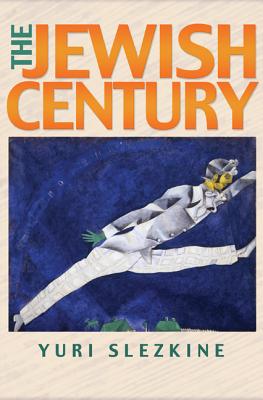

 Princeton University Press
Princeton University Press
The Jewish Century


Key Metrics
- Yuri Slezkine
- Princeton University Press
- Paperback
- 9780691127606
- 9.1 X 6 X 1.3 inches
- 1.4 pounds
- History > Jewish - General
- English
 Secure Transaction
Secure TransactionBook Description
This masterwork of interpretative history begins with a bold declaration: The Modern Age is the Jewish Age--and we are all, to varying degrees, Jews.
The assertion is, of course, metaphorical. But it underscores Yuri Slezkine's provocative thesis. Not only have Jews adapted better than many other groups to living in the modern world, they have become the premiere symbol and standard of modern life everywhere.
Slezkine argues that the Jews were, in effect, among the world's first free agents. They traditionally belonged to a social and anthropological category known as service nomads, an outsider group specializing in the delivery of goods and services. Their role, Slezkine argues, was part of a broader division of human labor between what he calls Mercurians-entrepreneurial minorities--and Apollonians--food-producing majorities.
Since the dawning of the Modern Age, Mercurians have taken center stage. In fact, Slezkine argues, modernity is all about Apollonians becoming Mercurians--urban, mobile, literate, articulate, intellectually intricate, physically fastidious, and occupationally flexible. Since no group has been more adept at Mercurianism than the Jews, he contends, these exemplary ancients are now model moderns.
The book concentrates on the drama of the Russian Jews, including �migr�s and their offspring in America, Palestine, and the Soviet Union. But Slezkine has as much to say about the many faces of modernity--nationalism, socialism, capitalism, and liberalism--as he does about Jewry. Marxism and Freudianism, for example, sprang largely from the Jewish predicament, Slezkine notes, and both Soviet Bolshevism and American liberalism were affected in fundamental ways by the Jewish exodus from the Pale of Settlement.
Rich in its insight, sweeping in its chronology, and fearless in its analysis, this sure-to-be-controversial work is an important contribution not only to Jewish and Russian history but to the history of Europe and America as well.
Author Bio
Yuri Slezkine is Jane K. Sather Professor of History at University California Berkley Department of History.
Professor Slexkine has published six books covering Russia, Soviet Union and Siberia.
The House of Government: A Saga of the Russian Revolution(link is external) (Princeton: Princeton University Press, 2017)
The Jewish Century(link is external) (Princeton: Princeton University Press, 2004).
In the Shadow of Revolution: Life Stories of Russian Women from 1917 to the Second World War(link is external), edited by Sheila Fitzpatrick and Yuri Slezkine (Princeton: Princeton UP, 2000).
Arctic Mirrors: Russia and the Small Peoples of the North(link is external) (Ithaca: Cornell University Press, 1994).
"The USSR as a Communal Apartment, or How a Socialist State Promoted Ethnic Particularism," Slavic Review 53, no. 2 (Summer 1994): 414-452.
Between Heaven and Hell: The Myth of Siberia in Russian Culture, ed. by Galya Diment and Yuri Slezkine (New York: St. Martin's Press, 1993).
Research Interests
Late Modern Europe: Russia
- Education
MA, University of Moscow - PhD, University of Texas, Austin
Videos
No Videos
Community reviews
Write a ReviewNo Community reviews